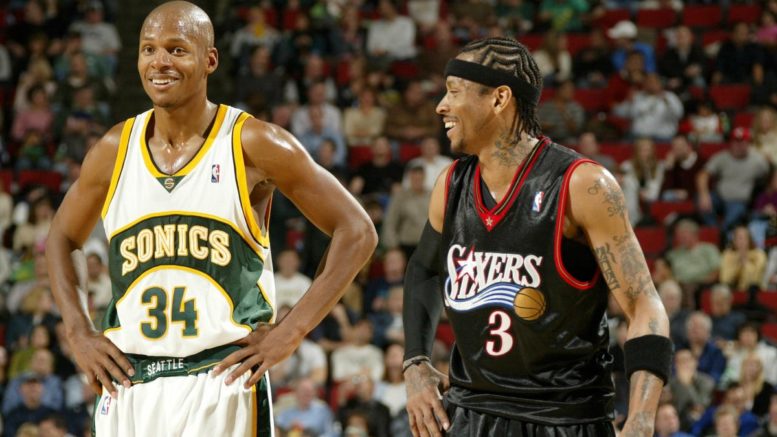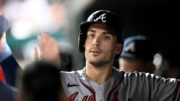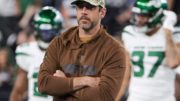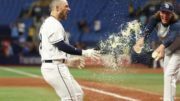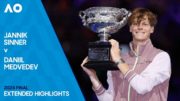The Oklahoma City Thunder have executed one of the shortest rebuilding periods in NBA history. Since the breakup of the Kevin Durant/Russell Westbrook pairing, leading into the current Thunder 2.0, only lasted three seasons of extreme tanking. Those losing efforts netted them the sixth pick in the 2021 NBA Draft, the second and 12th pick in 2022, and the 12th pick last summer. Those picks landed them the problematic Josh Giddey, the future of the center position and Rookie of the Year favorite Chet Holmgren and future All-Star Jalen Williams, along with a draft-night swap with Dallas for Cason Wallace. Those four players are all crucial parts of the current core. They join Shai Gilgeous-Alexander, our pick for MVP and an All-NBA First Team selection last season.
SGA came to the Thunder in the best trade of the 21st Century for Paul George, along with five first-round picks, plus two swaps from the Los Angeles Clippers. No other NBA executive hits on lottery picks like GM Sam Presti. And while he’s struck out on almost every late first- and second-round pick during this time, his absurd number of draft capital (the Thunder own up to 37 draft picks between 2024-2031) ensures him to be flexible moving forward to take swings and package in trades.
Presti is one of the top NBA execs and was responsible for establishing the Thunder as a serious contender for years on end in the 2010s. He is a beloved savant in Oklahoma City, a city that is rapidly working to keep up with his hipster-chic aura with experimental restaurants and edgy contemporary museums. If not for Presti, the Thunder would have never reached contender status with Durant, Westbrook and James Harden. With markets like Las Vegas, Mexico City, and even Seattle angling for an NBA franchise, they would have been the most likely candidates to be relocated. In appreciation of all that Presti has done for the city of Oklahoma City, you must acknowledge he was a gift from the Sonics franchise.
From the dust of Seattle rises the Thunder storm
Presti predates the Thunder, as he was hired in 2007 by owner Clayton Bennett, at just 30 years old, the youngest GM in the NBA at the time. Presti joined the San Antonio Spurs, where he started as an intern at 23 and worked his way to assistant GM. With the Thunder, Presti would emulate the Spurs’ commitment to culture and development in Oklahoma City, replicating what made the Spurs a functional and committed small-market franchise for decades. During the first Thunder U, the team won four straight division titles and made the Finals in 2012, but lost to the Heat in the Finals, all within the first four years as a franchise. Presti was the mastermind of turning a rebuilding team into a contender through shrewd draft picks and a mega trade. Sound familiar?
The 2004-05 Seattle SuperSonics had enjoyed a successful season, racking up an impressive 52 wins behind All-Stars Ray Allen and Rashard Lewis, who each averaged more than 20 points per game before losing in the second round. Unfortunately, the following years saw Seattle’s performance plummet. Seattle was unable to agree on funding for a new arena or upgrade, prompting Howard Schultz to sell to Bennett. In Bennett’s first season as owner in 2005-06, the team struggled, managing just 35 wins, followed by a further decline to 31 wins in 2006-07. By this time, the writing was on the wall. Then GM Rick Sund was fired and replaced by Presti in June of 2007, laying the groundwork for the team to rebuild through the draft with a brand new identity.
The drama in Seattle began in 2006 when the CEO of Starbucks Schultz and The Basketball Club of Seattle LLC, sold the team to OKC oilman Bennett for $350 million, who at the time promised Sonics fans he would keep the team in Seattle. As Durant said on the “Old Man and the Three” podcast, even he was shocked at the move as the bright-eyed, naive young star ready to start his career in Seattle,
“See, they told us we will be there for at least three or four years, so I settled in. Yeah, I bought a house,” Durant said. “Towards the end of the year, we just kept hearing, ‘Hold up, I think they making the change sooner than we thought.’ I remember we were in San Antonio, probably a week left in the season.”
Even Durant believed Bennett and the new ownership group would stay in Seattle. Whether a relocation was planned from the start, there was evidence it was the ulterior goal, as Aubrey McClendon, co-owner of the Sonics with Bennett, told the media, “We didn’t buy the team to keep it in Seattle. We hoped to come here.” Just 10 days later, the NBA fined McClendon $250,000 for the comments. A month later, Bennett filed papers to begin an arbitration process to get out of the final two years of the lease at Seattle’s Key Arena. Eight months later, NBA owners approved relocating the Sonics to Oklahoma City by a 28-2 vote. The move was official, with Presti heading the team’s rebuild under a new name, the Oklahoma City Thunder.
The making of a new franchise
Bennett, the former co-owner of the Spurs, had intel on Presti as the right man for the job and as such, handpicked Presti to become the GM of the Sonics in June of 2007. Upon being hired, Presti pulled off a blockbuster move on draft night with the Boston Celtics, acquiring the fifth pick and selecting forward Jeff Green in exchange for All-Star Sonics guard Ray Allen. Allen had been the face of the franchise for years, and trading the team’s best player was a bold move. But it netted Green to pair with Presti’s other lottery pick that night, Durant with the second pick. That night, Presti laid the groundwork for the legacy of the Thunder, but it happened as the Sonics. Durant wasn’t a Thunder pick. Neither was Green. To be fair, the Sonics took Russell Westbrook and Serge Ibaka, whom Presti selected fourth and 24th the following season in the first round, before they relocated to OKC. Most importantly, Presti did not originate with the Thunder. He was hired by the Sonics and drafted what would become the crux of the Thunder team that would break out of the Western Conference as the next great “dynasty.” After the Sonics were on the move to OKC, protests, lawsuits and handwringing ensued, but it was all for naught. The Sonics were dead and the Thunder was born.
Once the team landed in OKC, Westbrook would be the first star rookie to play their first season with the team, one of the reasons “Brodie” is often thought of as “Mr. Thunder.” Much of this history is chronicled in Sam Anderson’s 2018 book, “Boom Town: The Fantastical Saga of Oklahoma City, Its Chaotic Founding, Its Apocalyptic Weather, Its Purloined Basketball Team, and the Dream of Becoming a World-class Metropolis.” In it, Anderson parallels the early settlement of Oklahoma City out of the feral chaos and bedlam of the undeveloped Oklahoma territories with the Thunder’s rise from quickie upstart to NBA contender during the 2012- 2013 season. It also pulls back the curtain on Presti’s ticks, his obsession with symmetry and organization, going so far as making sure all the practice basketballs are faced the same way on the racks. For a decade, the OKC Thunder have stormed the NBA, securing the second-highest winning percentage of any team since 2010, surpassed only by Presti’s previous team, the Spurs.
During a recent episode of his podcast, 7PM in Brooklyn, Carmelo Anthony singled out the Thunder as the best-run organization he encountered during his NBA career, praising their understanding of player needs, communication style, and accountability. Unfortunately, Presti didn’t get a chance to impact the Sonics franchise as he was supposed to upon being hired, but the Sonics loss was the Thunder’s gain. And hopefully, Seattle is the next city to have an NBA team from expansion. In 2022, Presti spoke on the possibility of Seattle getting a franchise again.
“I do think it’s important to recognize also that Seattle is an incredible place,” Presti said. “It’s an incredible city. They will have a basketball team again, and I think all of us here are like that’s a positive thing. We’re hopeful that happens because it’s a great place great fans, and the arena that they’ve built there, it’s spectacular. So when it happens, it’s going to be great.”
Seattle is where the majority of Thunder U’s first championship run started. And the blending of the Thunder and Sonics histories has never been seamless. While it’s honorable to have Michael Cage as the color analyst for Thunder home games, Cage was a Sonics rebounding legend and never played a game in Oklahoma City. Especially considering how in 2014, the Thunder was the only championship-winning franchise in the league that chose not to wear a commemorative patch, honoring the Sonics 1979 championship.
“We have several teams who have a lineage that exists prior to the city that they’re in,” Christopher Arena, the NBA’s vice president of outfitting, identity and equipment, told The Oklahoman at the time. “Some teams embrace that past, some teams don’t. Whether it’s because of ownership changes, or perhaps the lineage is too great of a distance, or the team nickname changed, or whatever it may be, that’s their decision.”
Ironically, late last year, the Thunder faced a similar issue as the Sonics did, potentially losing their team based on disagreements on financing a new stadium. Bill Simmons stirred the pot, claiming OKC “stole” the Sonics franchise, and insinuated the Thunder were reaping what they sowed.
“I hate to start sh-t, but you know, OKC did steal a team from somebody else,” he said. “This is the smallest market in the league. They have the smallest arena in the league. Google ‘Oklahoma City Thunder arena lease.’ Go Google all that stuff. It’s been a story there for a couple of years. They want the taxpayers to pay for a new stadium.”
Oklahoma City Mayor David Holt championed a proposal for a minimum $900 million arena, financed by a temporary one-cent sales tax, while the Thunder would contribute $50 million. In December, Oklahoma City voters approved a penny sales tax to build a new, publicly owned downtown arena, securing OKC as home to the Oklahoma City Thunder beyond 2050. In addition, there is now a brand new Seattle arena, gleaming with the latest tech, that serves as the home for the NHL and WNBA teams Kraken and Storm, ready to welcome the NBA back to the city someday.
An awkward connection to the past
The Thunder have always had an awkward relationship with the Sonics lineage, incorporating and acknowledging some elements while rightfully ignoring others, like the Sonics’ 1979 championship. Or like when Kendrick Perkins, upon being traded to OKC, had to change his number because 43, his jersey number in Boston, was retired for Sonics great Jack Sikma. Most OKC fans don’t know who Sikma was, nor do they hold extensive knowledge of the Sonics franchise, so it would be disingenuous to have the city claim Seattle’s lone championship as their own. And why would they? Presti summed up in a 2020 interview how the team has learned from past mistakes.
“You look to the past for inspiration, but you’re certainly having to create something new going forward. I think that’s kind of the exciting thing about sports in general. It’s always evolving.”
The best possible outcome for both the Sonics and Thunder is for both to have a chance to extend their legacies as NBA franchises, with the city of Seattle bringing back a professional NBA team and the history of the Sonics along with it.
Original source here
#Thunder #return #contention #letx27s #forget #Supersonics

